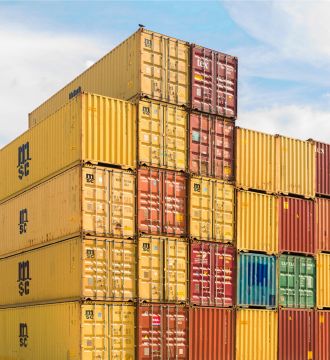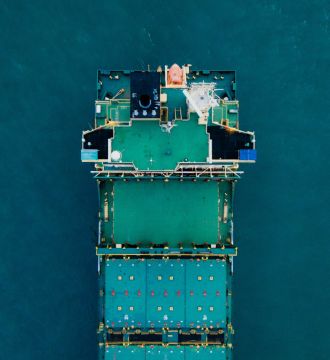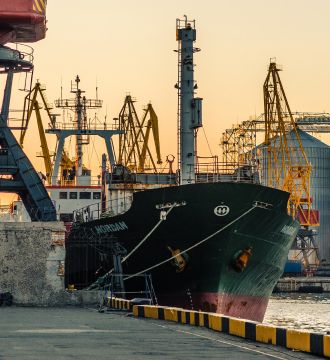Tools
Resources
It is important to know the appropriate terminology for handling your cargo and / or merchandise, so that you can find the best alternative in customs and transport procedures, in order to successfully complete your operations.
In order to provide you with a better service, we offer you aids such as the Glossary of Customs Terms, Foreign Trade and Maritime-Port Terms, and tools to facilitate your customs management process, tariff classification, weights and measures, currency and others.




Glosary - INCOTERMS
The seller makes the merchandise available on his premises. This term places the maximum obligation on the buyer and minimum obligations on the seller. The term Ex Works is often used when an initial offer is made for the sale of goods at no cost.
EXW means that a buyer incurs the risks to carry the merchandise to its final destination. Either the seller does not load the merchandise on the collection vehicles and does not make a declaration for export, or if the seller does not load the merchandise, he does so at the buyer's risk and cost.
If the parties want the seller to be responsible for the loading of the merchandise upon departure and for bearing the risk and costs of such cargo, this must be made clear by adding explicit expressions to that effect in the sales contract.
The buyer organizes the collection of the cargo from the ship site designated by the supplier, owns the cargo in transit, and is responsible for clearing the merchandise through customs. The buyer is also responsible for completing all export documentation.
These documentary requirements can cause two main problems. First, the stipulation for the buyer to complete the export declaration can be a problem in certain jurisdictions (including the European Union), where customs regulations will require the declarant to be either a resident natural person or corporation within the jurisdiction.
Second, most jurisdictions require companies to provide proof of export for tax purposes. In an Ex Works shipment, the buyer is under no obligation to provide such proof, or indeed even to export the goods. It is therefore of the utmost importance that these issues are discussed with the buyer before the contract is agreed. It may well be that another Incoterm, such as the seller's FCA facilities, may be more suitable.
Responsabilities
Buyer |
Seller |
|---|---|
|
The seller delivers the merchandise, dispatched for export, in a named place. This can be to a carrier designated by the buyer, or to a third party designated by the buyer.
It should be noted that the chosen place of delivery influences the obligations of loading and unloading the goods at that place. If delivery takes place at the seller's premises, the seller is responsible for loading the goods to the buyer's carrier. However, if delivery takes place at any other place, the seller is considered to have delivered the goods once the transport from him has arrived at the agreed place; The buyer is responsible for both unloading the merchandise and loading it in his own vehicle.
Responsabilities
Buyer |
Seller |
|---|---|
|
|
The seller makes the delivery when the merchandise is placed alongside the ship at the port of shipment. This means that the buyer has to bear all costs and risks of loss or damage to the merchandise from that moment on.
The FAS term requires the seller to clear the goods for export, which is a change from previous Incoterms versions that required the buyer to arrange for export clearance. However, if the parties want the buyer to clear the goods for export, they must make this clear by adding explicit expressions to that effect in the sales contract. This term can be used only by sea or by inland waterways.
Responsabilities
Buyer |
Seller |
|---|---|
|
|
FOB means that the seller pays for the delivery of the goods to the ship, including cargo. The seller must also arrange for export clearance. The buyer pays the cost of ocean freight, bill of lading fee invoice, insurance, unloading and cost of transportation from the port of arrival to destination.
The buyer is in charge of the vessel, and the shipper must load the merchandise on the designated vessel at the port of shipment in accordance with the dates stipulated in the contract of sale as informed by the buyer. Risk passes from the seller to the buyer when the merchandise is loaded on board the ship.
This term has been misused a lot in the last three decades since Incoterms 1980 explained that the FCA should be used for container shipments.
Responsabilities
Buyer |
Seller |
|---|---|
|
|
The seller pays for the transport of the merchandise to the named port of destination. Risk transfers to the buyer when the goods have been loaded on board the ship in the country of export. The sender is responsible for the costs of origin, including the costs of export clearance and cargo for transportation to the specified port.
The carrier is not responsible for the delivery to the final destination of the port (generally the buyer's facilities), or for the purchase of insurance. If the buyer requires the seller to obtain insurance, the CIF Incoterm must be considered. CFR should only be used for non-containerized ocean freight; for all other modes of transport it must be replaced with CPT..
Responsabilities
Buyer |
Seller |
|---|---|
|
|
This term is broadly similar to the CFR term, with the exception that the seller is required to secure insurance for products in transit at the named port of destination.
CIF requires the seller to insure the goods at 110% of their value under at least the minimum coverage of the Institute of Cargo Clauses of the Institute of Insurers of London (which would be Institute Cargo Clauses (C)), or any similar set of clauses . The policy must be in the same currency as the contract.
CIF should only be used for non-containerized ocean freight; for all other modes of transport it must be replaced with CIP.
Responsabilities
Buyer |
Seller |
|---|---|
|
|
CPT supersedes the venerable term C&F (cost and freight) and CFR for all modes of transportation except non-containerized cargo by sea.
The seller pays for the transport of the merchandise to the place of destination. Risk transfers to the Buyer at the time of delivering the goods held by the first carrier at the place of shipment in the exporting country. The sender is responsible for the costs of origin, including export clearance and freight costs for transportation to the named place (normally a destination port or airport). The carrier is not responsible for the delivery to the final destination (generally the buyer's premises), or for the purchase of insurance. If the buyer requires the seller to obtain insurance, the CIP Incoterm should be considered.
Responsabilities
Buyer |
Seller |
|---|---|
|
|
This term is broadly similar to the previous CPT term, with the exception that the seller is required to secure insurance for the goods in transit. CIP requires the seller to insure the goods at 110% of their value under at least the minimum coverage of the Institute Cargo Clauses of the Institute of Insurers of London (which would be Institute Cargo Clauses (C)), or any similar set of clauses. The policy must be in the same currency as the contract.
CIP can be used for all modes of transport, while the equivalent CIF term can only be used for non-containerized ocean freight.
Responsabilities
Buyer |
Seller |
|---|---|
|
|
It can be used for any mode of transport, or where there is more than one mode of transport. The seller is responsible for organizing the transport and the delivery of the goods ready to unload from the transport upon arrival at the agreed place.
The costs are not paid by the seller under this term. The seller assumes all the risks involved in taking the merchandise to the agreed place.
Responsabilities
Buyer |
Seller |
|---|---|
|
|
DPU replaces the former Incoterm® DAT (Delivered At Terminal). The seller delivers when the goods, once unloaded are placed at the disposal of the buyer at a named place of destination. The seller covers all costs of transport (export expenses, transportation, main carrier unloading and port charges at the destination port) and assumes all risks to the destination port or terminal.
The terminal can be a port, airport, or inland freight exchange. Import duties / taxes / customs costs are borne by the buyer.
Responsabilities
Buyer |
Seller |
|---|---|
|
|
The seller is responsible for the delivery of the merchandise to the designated place in the buyer's country, and pays all costs when bringing the merchandise to the destination including import duties and taxes. The seller is not responsible for the unloading.
This term is often used in place of the non-Incoterm term "Free In Store (FIS)". This term places the maximum obligations on the seller and minimum obligations on the buyer.
With delivery to the destination, all risks and responsibilities are transferred to the buyer and the seller is deemed to have completed his obligations.
Responsabilities
Buyer |
Seller |
|---|---|
|





